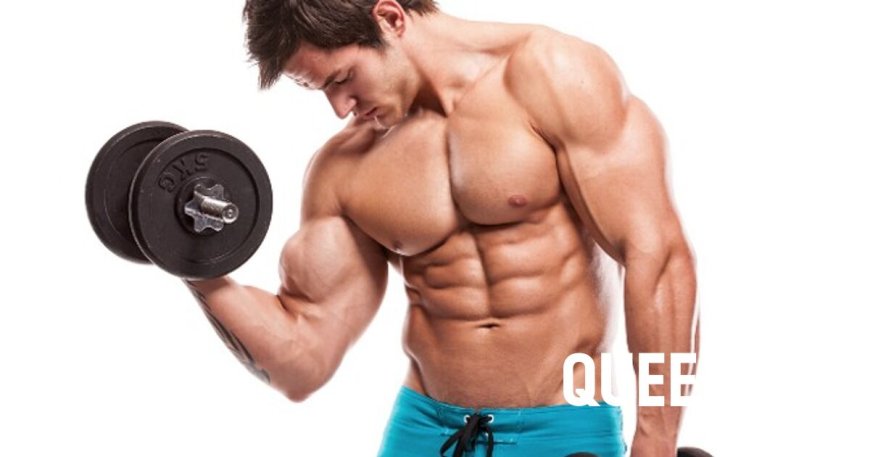A poor relationship with your dad might make you more prone to ‘bigorexia’
Are you obsessive about growing muscles? Are other areas of your life beginning to suffer?


A man who has a poor relationship with his father may be at greater risk of developing muscle dysmorphia. That’s the conclusion of a new study.
Muscle dysphoria—sometimes called ‘bigorexia’ or ‘reverse anorexia’—is defined by the American Psychiatric Association as a preoccupation with the idea your body is too small or not muscular enough.
It goes beyond just being a regular gym goer. Those with the condition may spend hours each day exercising or becoming obsessive about growing muscles. They may begin to neglect their work and relationship with others as a result.
The causes of bigorexia are varied. The pressures of social media, and the way the media presents gym-toned bodies as the ideal, all play into it. The perceived link between muscles and masculinity is a significant factor. Muscles equate with virility, sexual desirability and strength in the eyes of many.
Gay men and muscle-building supplements
Some studies have already found that LGBTQ+ people are more likely to experience body dysmorphic disorders.
Research published last year in Eating Disorders found high rates of muscle-building supplement use in gay and bisexual adults. In a sample of just over 2,000 people, 44% of the gay men revealed they used muscle-building supplements (from simple protein shakes and creatine up to anabolic steroids).
The authors of this new study, published in Personality and Individual Differences note, “there is additional evidence that certain marginalized groups, such as African American men, gay and transgender men, may be more vulnerable to this masculine aesthetic ideal. In addition to increasing the likelihood of sexual encounters, it may also allow gay men to defend against the stigma of homosexuality through a more masculine presentation.”
They wanted to test a theory: If fathers are the primary masculine role model in a young boy’s life, does having an absent father, or a poor relationship with a father, increase the tendency toward muscle dysmorphia?
Other studies have suggested a link between a poor relationship with one’s father and the development of narcissistic traits – either the development of an entitled superiority complex (grandiose narcissism), or a vulnerable narcissism, defined as being in greater need of validation from others.
The researchers recruited just over 500 men who were regular exercisers. They asked them questions to assess signs of muscle dysmorphia and about their relationship with their father.
Feelings of unworthiness lead to a preoccupation with appearance
They concluded there’s a link between a poor relationship with one’s dad, vulnerable narcissism, and muscle dysmorphia.
As they put it, “A perceived poor relationship with their father (e.g., lack of a physical relationship, minimal involvement) may lead to males developing unhealthy views of themselves, characterized by low self-esteem and self-centeredness. Attempts to seek validation and build self-esteem may then be manifested by the preoccupation with muscularity.”
If your parents are distant and critical, you can end up feeling unworthy. This in turn can intensify concerns about your appearance.
Feeling alienated from one’s peers may make matters worse. This can heighten “a sense of inadequacy and vulnerability, intensifying concerns about body image and muscles.”
They recommend anyone counseling those with bigorexia stay aware of these issues. In particular, therapists should ask questions about the sufferer’s relationship with their father.
Complex causes
In a statement to Queerty, two of the study’s authors (Dr. Matt W. Boulter and Dr. Sebastian Schanche Sandgren) stressed that the causes of muscle dysmorphia are complex. It’s wrong to label anyone who wants to grow big muscles as a narcissist.
“An important takeaway from our research is that we consider narcissism along a spectrum, from low to high levels. We view narcissism as a trait in the same way we would view for example extraversion, or conscientiousness. Consequently, we avoid using the label ‘narcissist’ and we encourage others to avoid using the term ‘narcissist’ too,” they said via email.
“Secondly, it is also important to recognize that the links with vulnerable narcissism and paternal attachment are only two of several risk factors for muscle dysmorphia. Overall, it is a complex picture that includes other factors such as perfectionism, societal pressures, bullying, self-esteem, etc.”
Jason Nagata is an Assistant Professor of Pediatrics at the University of California, San Francisco. He’s an expert in the field of body dysmorphia and conducted last year’s study on gay men and muscle supplements. He welcomed this new study.
“Three of the biggest influences on body image in men are parents, peers, and the media,” he told Queerty. “This study finds that a poor relationship with one’s father is associated with muscle dysmorphia. It would be important to investigate if the study’s findings are true for gay men, who might have poorer relationships with their fathers and higher symptoms of muscle dysmorphia.”
Nagata also offered advice for anyone who thinks they might have a problem.
“People with muscle dysmorphia should seek professional help. Muscle dysmorphia and eating disorders are best supported by an interdisciplinary team including a mental health, medical, and nutrition provider.”

 Mark
Mark 





